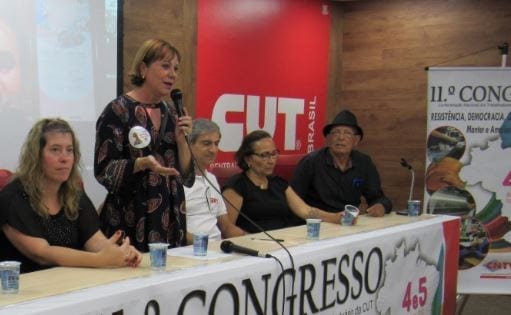
Apr 12, 2019
In a historic achievement, delegates to the 11th Congress of Brazil’s garment worker union federation, CNTRV (National Confederation of Clothing Workers) last week voted for gender parity in leadership and adopted a pro-women’s rights agenda.
The union achieved parity not only in the overall number of women and men in leadership, but also in its top executive positions.
“Women are empowered at the highest levels in the organization,” said CNTRV President Cida Trajano.
In partnership with the Solidarity Center, CNTRV in recent years ran a nationwide women’s leadership project, preparing women workers to assume leadership positions, according to Trajano.
“This is proof that the effort to form and organize feminist activism is worth it,” she said.
Over the next four years, CNTRV will focus on a pro-women’s rights agenda, including developing programs to combat gender-based violence at work and empower women workers; allow greater space for feminist agendas in communications; consult with women leaders and activists when developing recommendations for public policies affecting women; and expand women’s participation in collective bargaining and wage negotiations.
The Solidarity Center supports women workers seeking greater voice at the workplace across a range of employment sectors in Brazil, including the chemical, garment and hospitality industries, and domestic work. Together with the CNQ (National Confederation of Chemical Workers) CNTRV and CONTRACS (National Confederation of Service and Retail Workers), the Solidarity Center conducts trainings and campaigns to equip women to advocate for safer working conditions and more equitable salaries on the job, and to assume more active leadership roles in their unions.
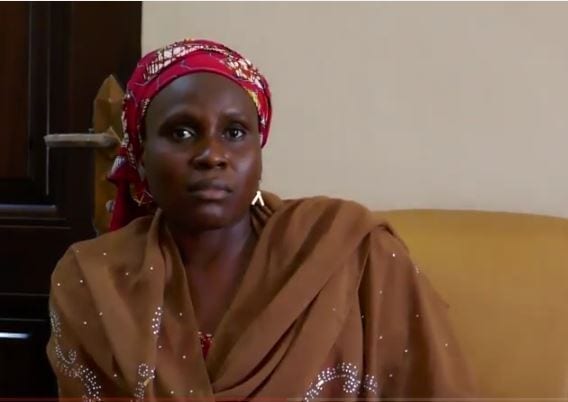
Mar 28, 2017
Even as an uneasy but relative peace takes hold in northeastern Nigeria, the death toll and violence of the past several years is having long-term effects on returning teachers, healthcare workers and civil servants in Borno state, according to a joint survey completed by public-sector unions last month.
The unions, with Solidarity Center support, documented hundreds of deaths by violent attacks—attacks in which many public-sector workers were specifically targeted.
The Nigeria Union of Teachers (NUT), Borno State Wing, estimates that it has lost more than 500 members, some to homemade bombs hurled at concrete classrooms. The Medical and Health Workers Union of Nigeria (MHWUN), Borno state, counted losses in the hundreds. The Borno state branch of the Nigeria Civil Service Union (NCSU) estimates more than 70 members were killed by gunshot or bomb blast.
Although many public-sector workers are now returning to their jobs, Mamman Bukar, Borno state NCSU Chairman, said almost 75 percent of civil servants represented by the union who are back on the job are struggling.
“People have started moving around, doing their normal jobs” he said, but, “some lost their senses because of the trauma of the situation.”
A male healthcare worker, for example, described a bloody armed assault on the hospital in which he was working on February, 11, 2014, when insurgents raided the pharmacy and murdered his supervising physician. Although the worker spoke on camera to record the eyewitness account, he asked for safety reasons that his interview and name not be publicly released.
Others described similar violent scenes at their workplace: “Then I saw half of a body on the ground,” said a civil servant with the Ministry of Agriculture, describing the aftermath of a bomb attack in May last year on the State Secretariat in the Borno state capital, Maiduguri. He also asked to remain anonymous.
Nurse-midwife Liyatu Haruma, who surveyed members of the National Association of Nigerian Nurses and Midwives, said she learned that the long-term impact on her colleagues is, “deep and close.” Many of them were injured, had their houses burned or witnessed people being killed, she said.
Borno state teacher Muhammad Kirala, who collected eyewitness accounts from his colleagues, said teachers he interviewed described watching colleagues “slaughtered like animals,“ with knives, run down by vehicles, or killed in bomb blasts as they attempted to escape gunmen.
Workers also reported serious economic consequences of the violence on them and their families, including the loss of income during long periods when their workplaces were too dangerous or damaged to access. Many who were injured said they did not receive compensation for medical expenses. Some said they could not pay for the health care they need to return to work successfully, and that the state is not providing support.
“[They] don’t have money to remove bullets from them,” said Yusuf Inuwa, head of the Borno state Medical and Health Workers Union of Nigeria (MHWUN).
Several workers showed interviewers remaining physical damage, including shrapnel still embedded under their skin.
A civil servant who spent almost four months in the hospital recovering from severe bomb-blast injuries to his leg and foot—and reporting anonymously for safety reasons—said he had received emergency funds from his union, but no salary for the time he was in the hospital nor government compensation for his injuries.
“Presently, I want my salary,” he said.
Missing workers were not counted in the unions’ surveys. An estimated 1.8 million people have been displaced in Borno State, including more than 19,000 teachers.
According to the International Labor Organization (ILO), the proper response of ILO member states in post-conflict situations within their borders is promotion of full employment and special action to assist all persons whose usual employment has been interrupted, per Recommendation No. 71– Employment (Transition from War to Peace), 1944. A revision of the Recommendation, which began last year, will include new post-conflict state responsibilities, including promoting employment, reinforcing state institutions, and fostering social protection, social dialogue and respect for fundamental rights.
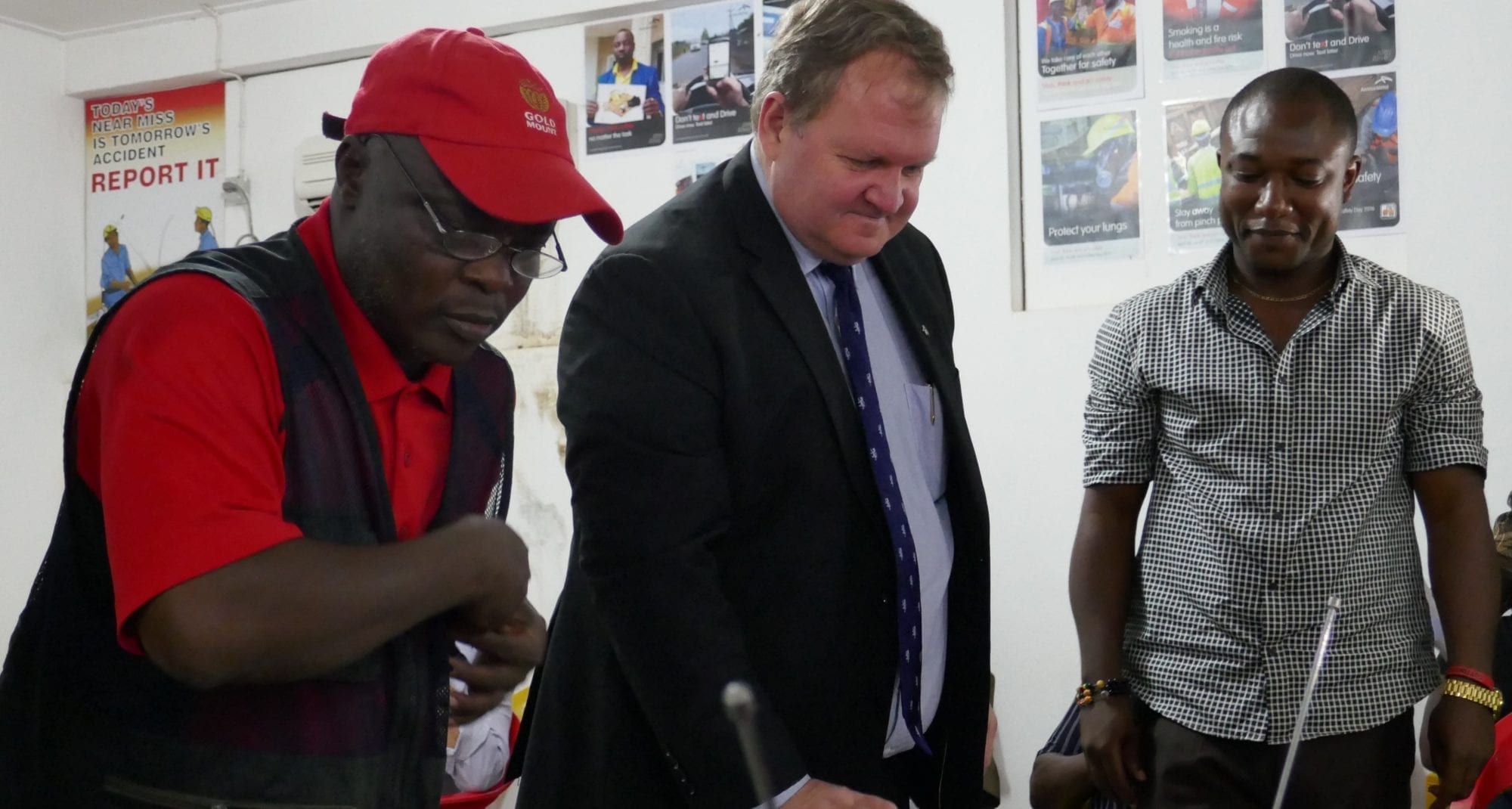
Mar 1, 2017
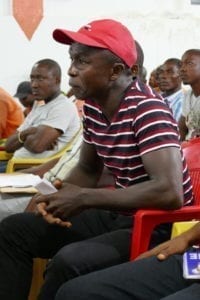
Member of ArcelorMittal Liberia Workers Union. Credit: Solidarity Center/Christopher Johnson
Hundreds of miners, forklift drivers and other workers at ArcelorMittal in Libera recently regained the jobs they lost following the 2014 Ebola epidemic and won back important benefits as part of a new collective bargaining agreement.
The ArcelorMittal Liberia Workers Union and the company late last month entered into the two-year agreement, which continues a joint health and safety committee and opened the door to higher wages through, “comprehensive job mapping to adjust salaries where they are inconsistent with the positions,” according to the union.
The United Workers Union of Liberia (UWUL) helped negotiate the agreement, and signed on behalf of the ArcelorMittal Liberia Workers Union. The workers’ chief negotiator and team members on this agreement had all participated in Solidarity Center training programs and consultations with Solidarity Center staff before negotiations began.
David Sakoh, UWUL secretary general, described the agreement as “an incredible achievement” given that it was completed during a “time of crisis,” which he said included the Ebola epidemic and falling commodities prices. ArcelorMittal last year reported a loss of nearly $8 billion due to falling steel prices and write-offs in its mining business.
The United Steelworkers (USW), Solidarity Center’s U.S. union partner in Liberia programs, thanked workers and management for their efforts to ensure through the new agreement that “the interests of workers will be represented and respected.”
The workers’ first agreement with ArcelorMittal Liberia was negotiated in 2012, making the company the second major investor in Liberia to sign a collective bargaining agreement (CBA). It came four years after a groundbreaking CBA between Firestone Natural Rubber Liberia and the Firestone Agricultural Workers.
Workers in Liberia have forged a decades-long partnership with the Solidarity Center and their counterparts in the United States, during which they received skills-development trainings to hone workers’ organizing and bargaining techniques, as well as support for their efforts to combat the Ebola epidemic, prevent child labor, improve Liberian labor law, address the growth of insecure informal economy jobs and seek gender equality within their unions.
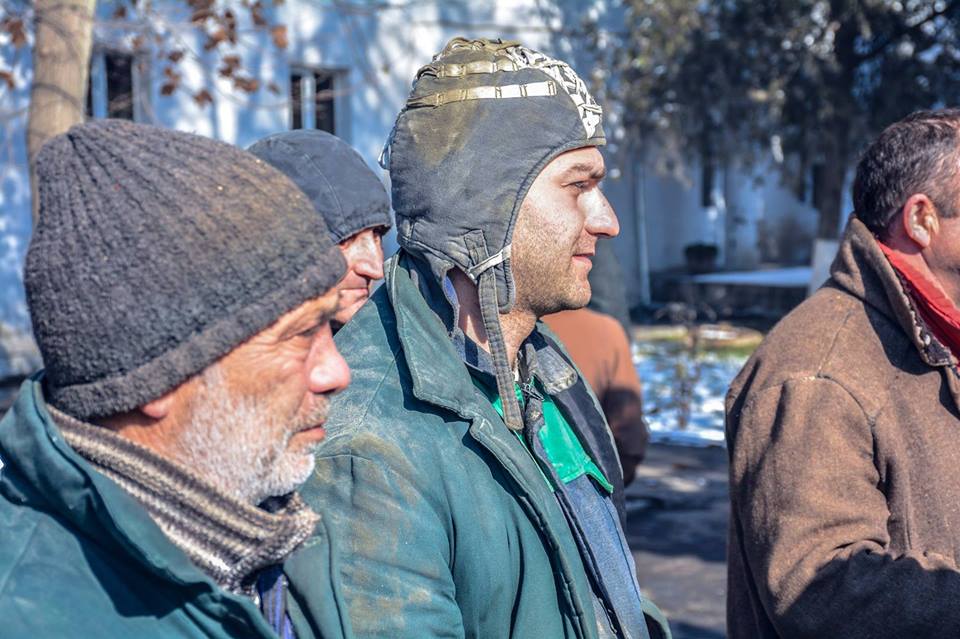
Feb 13, 2017
Some 350 workers at the Georgia chemical company Rustavi Azot recently were dismissed without notice or compensation and nearly 2,000 more threatened with firing unless they accept new, short-term contracts. The actions by the company, which produces mineral fertilizers, ammonia, sodium cyanide and nitric acid, generated protests in Rustavi and Tbilisi, garnered international support and prompted local media speculation about potentially questionable business dealings by the company’s former owner, Bank of Georgia.
The workers did not receive notice or access to union representation before being fired in January. Instead, they learned they had been dismissed when their passes failed to grant them access to the plant. Workers protesting their dismissals on February 2 suffered broken ribs and other injuries after they were violently removed from the company building by police.
Workers still employed at the plant say they were confronted with new contracts and threatened by their employer with firing if they refused to sign, and denied union representation and legal consultation. They say their future with the company is now uncertain.
Solidarity Center partner Georgian Trade Union Confederation (GTUC) is leading a legal challenge on behalf of dismissed workers, asserting that the firings violate Georgia’s labor code and the employer’s collective bargaining agreement with the Trade Union of Metallurgy, Mining and Chemical Industry Workers of Georgia (TUMMCIWG), a GTUC affiliate. With Solidarity Center assistance, the GTUC is preparing lawsuits against the company, demanding reinstatement or the compensation to which workers are entitled.
Workers from multiple unions, including representatives from IndustriAll affiliates in Armenia, Belarus and Kyrgyzstan joined members of TUMMCIWG and the GTUC for a global solidarity rally this week in Rustavi, presenting to fired workers letters of support from trade unions in Moldova, Russia and Ukraine.
Some Georgia media outlets are questioning how Rustavi Azot changed hands last September through a secretive auction shortly after receiving a $155 million loan from the European Bank for Reconstruction and Development (EBRD).
Rustavi Azot, located 14 miles south from Tbilisi, generated 84 percent of its sales last year from exports, including to some European Union countries.
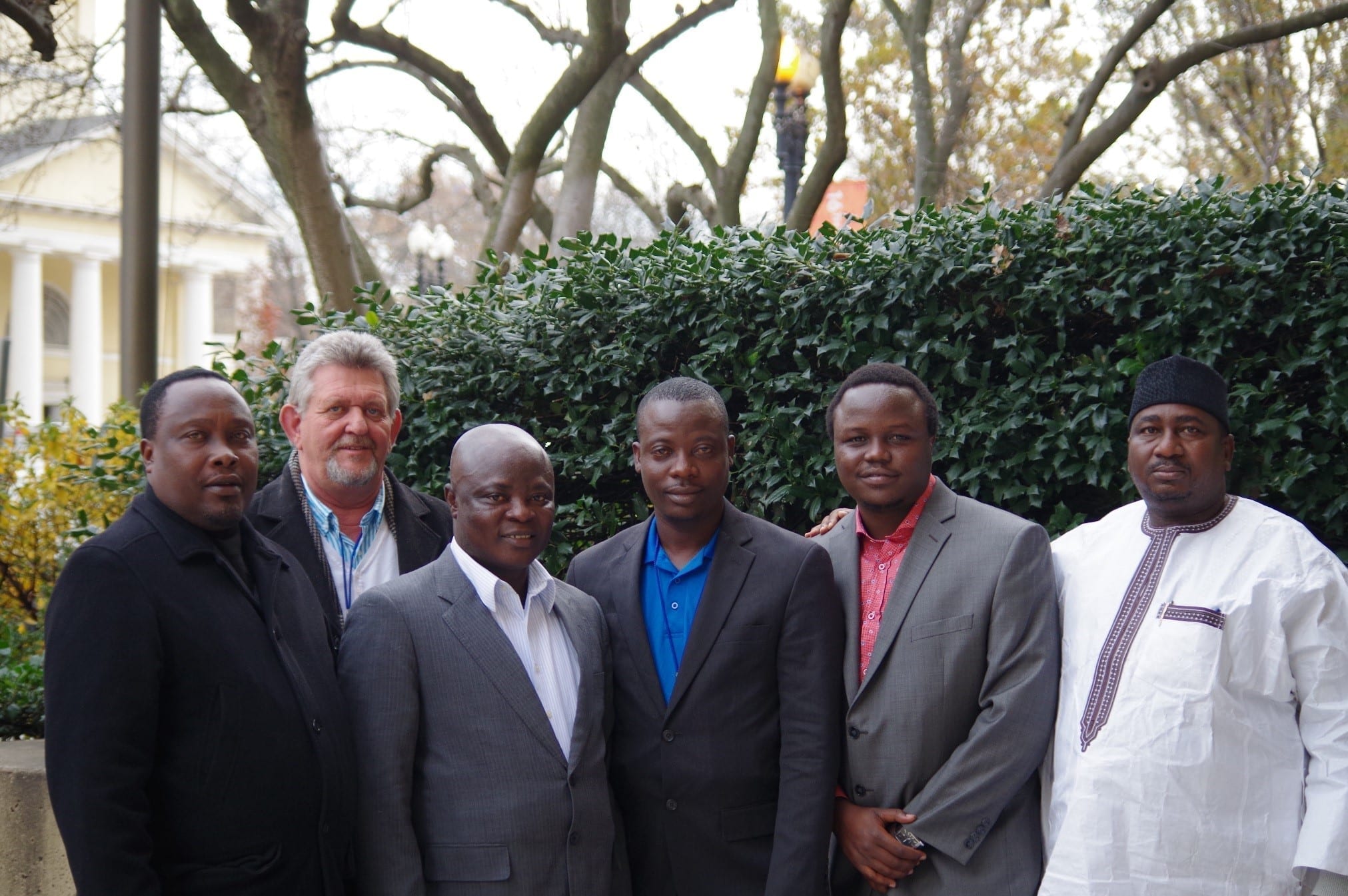
Dec 10, 2015
Addressing unemployment and underemployment, especially for young workers, is the most pressing issue for trade unions across Africa, according to participants in an African Labor Leaders Exchange Program sponsored by the Solidarity Center.
Speaking at a December 9 panel discussion at the AFL-CIO in Washington, D.C., six union leaders from Kenya, Liberia, Nigeria and South Africa discussed the challenges in securing economic prosperity for working people—and their strategies for empowering workers in the formal and informal economies.
“What faces us is high levels of unemployment, poverty,” said Edward de Klerk, deputy general secretary of South Africa’s United National Transport Union (UNTU).
“Unemployment is an African issue,” said Philip Kwoba, director of Youth Organizing with the Central Organization of Trade Unions (COTU) in Kenya. Unions in Kenya are reaching out to informal economy workers, which include many young workers, helping them form worker savings associations as a step toward unionization and gaining bargaining rights. “We are allocating resources to help,” said Kwoba.
Members of the panel, moderated by Solidarity Center Regional Program Director for Africa Imani Countess, said poverty also is fueled by low wages. “Wage inequality is this battle still we have got,” said de Klerk. In Nigeria, unions are tackling wage issues by addressing government policies that reduce the pay of public-employees, including teachers, said Muhammed Nasir Idris, National Treasurer Nigeria Union of Teachers (NUT).
Lack of employment opportunity and poverty in Liberia puts youth at risk of labor trafficking within the country’s borders, said Liberia Labor Congress (LLC) General Secretary David Sackoh.
Sackoh said labor recruiters take children from parents in their villages, promising the children will go to school in the city. Instead, the children are used in forced labor. “Even though our research shows (the children) want to return,” they are unable to do so for seven to 10 years,” he said.
Sackoh pointed to the Liberian trade union movement’s tremendous victory in eradicating child labor at the Firestone Natural Rubber Liberia plantation, and said the union movement now is working to address the issue at the seven other plantations across the country.
During questions with the audience, which included a packed crowd of union activists, policy experts and international experts, union leaders also discussed drawing more women into trade union leadership.
“Getting women elected to high offices is now on the union agenda,” said Boniface Kavuvi, general secretary of the Kenya Union of Commercial, Food and Allied Workers (KUCFAW). Kavuvi pointed to domestic workers in Kenya, represented by KUDHEIHA, as an example of dynamic organizing and strong leadership by women in Kenya. “They have done a tremendous job,” he said.
In Liberia, unions are pushing for 30 percent representation by women in union leadership, mirroring the country’s effort to increase women’s representation in the national legislature, said Isaac Grant, LLC organizing coordinator.
The six union leaders traveled to the United States for a South–South labor leaders’ exchange in which African labor leaders met with community and trade union organizers across the southern United States. The Solidarity Center worked with the U.S.-based labor education program, the National Labor Leadership Initiative (NLLI), to facilitate the exchange, sponsored by the U.S. Department of State’s Bureau of Educational and Cultural Affairs.






